
Birding Around Las Vegas, Favorite Places Far Away

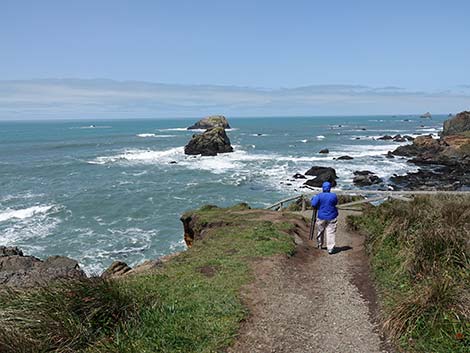 Birdwatcher arriving at Green and Puffin Rocks Overlook |
Overview While there are many headlands along the Pacific coast, this quiet place has always been special. Perhaps because the area has a mix of woods and open ocean that provide for a variety of birds (including nesting Tufted Puffins in the springtime), or perhaps because the headland overlooks "College Cove," the clothes-optional beach we enjoyed in the 1970s, but this has always been a favorite place to bird. A nice, quiet trail runs through the damp, moss-covered woods to a brushy headland overlooking the ocean where several off-shore islands can be seen harboring sea lions, harbor seals, and nesting birds. Because the offshore views are towards the sunset, the best birding here is earlier in the day when the sun is at your back. Link to Map or Aerial Photo. |
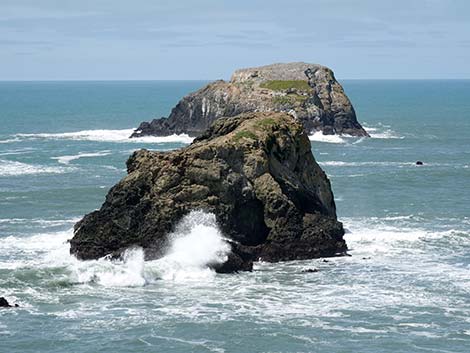 Puffin Rock (close) and Green Rock (far) |
Description Elk Head is a quiet headland overlooking the Pacific Ocean. The area is part of Trinidad State Beach, so it is public land and protected from development. A trail from the parking area leads into a deep-and-dark mixed woods of alder and Douglas fir with a heavy understory of shrubs and ferns. These woods seem to be totally quiet or completely alive with Chestnut-backed Chickadees, Ruby-crowned Kinglets, Winter Wrens, warblers, and Varied Thrushes. Pileated Woodpecker, Red-breasted Sapsucker, and Red Crossbill are common residents, and Band-tailed Pigeons can be common during summer. A short distance from the parking area, the trail forks several times with branches running over the cliffs and down to the beach (left), out along the south edge of the bluffs (straight), and more directly towards the promontory overlooking Green Rock (right). Staying to the left, but staying on top of the cliffs, the trail runs out along the edge of the cliffs. Near the point, the forest gives way to brushy fields. Beyond the trees, there are several places to scope the rocks, water, and sandy beach in College Cove (in the old days, I doubt people thought I was watching birds with my spotting scope). |
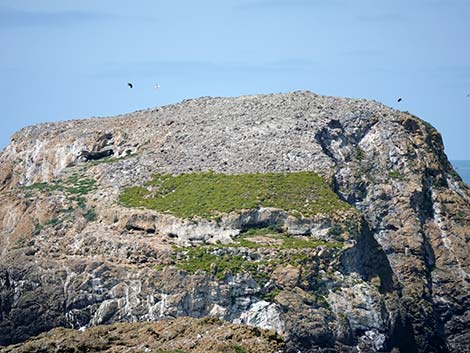 Green Rock where the Puffins nest |
The trail stays along the edge of the cliffs above College Cove all the way out to a point. There are some huge blackberry thickets along here, so be sure to stop for trail snacks in the fall. The rocks below the point (towards the open ocean) have been one of my most reliable places to see Wandering Tattlers. From this point, you can look southwest to a large offshore rock (Flatiron Rock) that can be covered (almost literally) with California Sealions, Brown Pelicans, and Double-crested Cormorants. From this point, you can also look to the northwest and see two more large offshore rocks. The larger, farther rock is Green Rock, while the closer, smaller rock is the one I call Puffin Rock. Wander along the trail to the north towards the northwest corner of Elk Head. Before you get to the corner, you will pass the other trail that leads back the parking area, which makes for a nice loop. In the old days, this area was grassy and reliably produced Savannah Sparrows, but the shrubs have grown in thick now, and you will have trouble chasing down the sparrow and other little birds out here. Be sure to watch the sky for swallows, hawks, and falcons. |
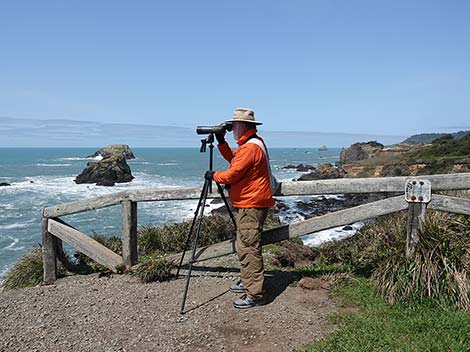 Jim scoping Puffin (close) and Green rocks (far) |
Out at the northwest corner of Elk Head, check the offshore Green and Puffin Rocks for nesting seabirds, check the water surrounding the rocks, and check the water and shoreline of the inlet on the north side of Elk Head (which is a good place to see harbor seals, Harlequin Ducks, Black Oystercatchers, and nesting Belted Kingfishers). Tufted Puffins can be seen lounging around their burrow entrances on Green and Puffin Rocks during spring and summer. Puffins nest in burrows and tend to be late raisers, so you don't need to get there at the crack of dawn to see them. While there, use a spotting scope to carefully check all of the holes in the ground on the top and sides of Puffin Rock. They nest on Green Rock too, but those are farther away and harder to see. |
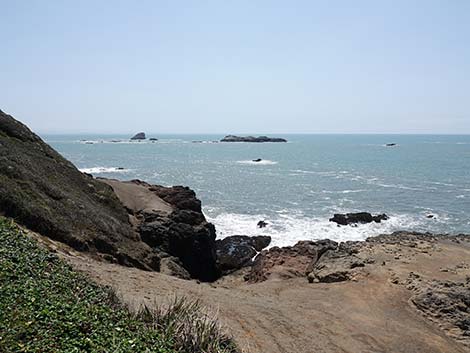 Flatiron Rock |
Puffin Rock is also a good place to see nesting Common Murre, Pigeon Guillemots, Pelagic Cormorants, and Brown Pelicans. Be sure to scope all of the little black dots on the water, as some might turn out to be phalaropes or murrelets. We've occasionally seen shearwaters here too. Location Elk Head is located on the Northern California coast at Trinidad (which is just north of Arcata and Eureka). To get to Elk Head, exit Highway 101 at downtown Trinidad and drive on the main road towards the ocean. Drive west past the grocery store-strip mall complex, and when the main road curves 90 degrees to the left (south), turn right (north) onto Stagecoach Road, which is a narrow and winding road. Drive north on Stagecoach Road for most of a mile to Anderson Lane. Continue straight (north) past Anderson Lane for about 0.1 miles to a dirt road on the left. Follow the dirt road west for a short distance to the northern (right) of two parking areas. There are no signs at the road, but signs in the access road indicate that you are in the right place. |
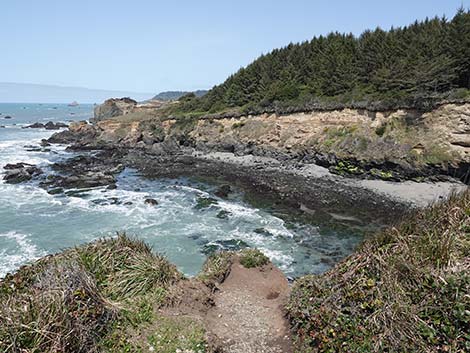 Rocky shoreline with seals and Great Blue Heron |
Hours Appears to be always open, although signs at the parking lot say day-use only. Fees None. Caution Break-ins have occurred here, so put valuables in the trunk before you arrive, and then lock your car. It would be easy to fall off the cliffs at the end of the trail. |
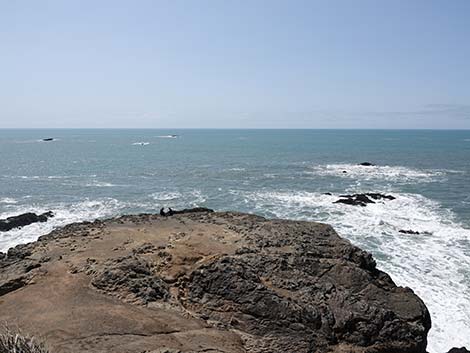 Two humans on the edge of a big ocean |
Specialties Tufted Puffins are my main attraction, but there are also lots of Common Murre and Brown Pelicans, plus Pigeon Guillemots, Pelagic Cormorants, Harlequin Ducks, Black Oystercatchers, Belted Kingfishers, little black dots on the water (phalaropes and murrelets), and a few shearwaters. There are many California Sealions and Harbor Seals in the area too. The woods can be productive for Chestnut-backed Chickadees, Ruby-crowned Kinglets, Winter Wrens, warblers, Varied Thrushes, Pileated Woodpecker, Red-breasted Sapsucker, Red Crossbills, and Band-tailed Pigeons. For More Information Contact the Redwood Region Audubon Society or Trinidad State Beach. |
Photos of Getting to Elk Head Overlook
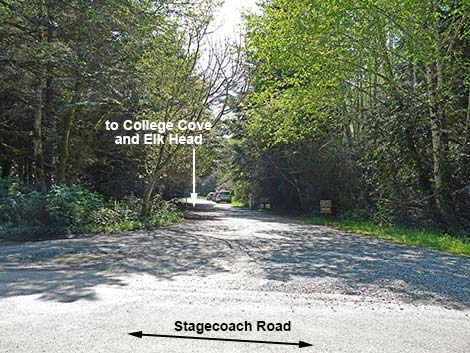 Stagecoach Road at Elk Head Road (view SW) |
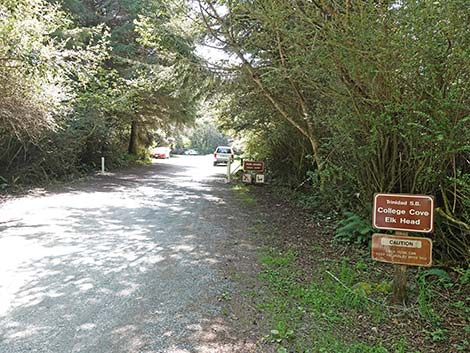 Entrance to College Cove and Elk Head Parking (view SW) |
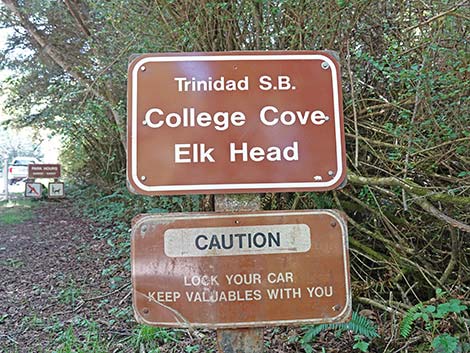 Entrance Sign (view SW) |
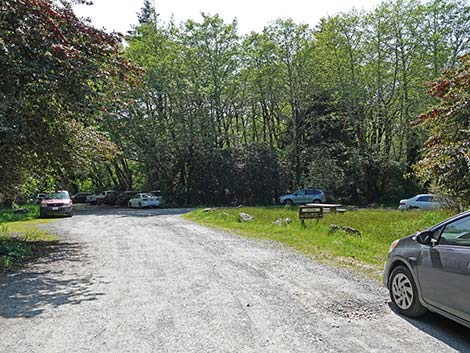 Entering the parking area (trailhead to the right; view SW) |
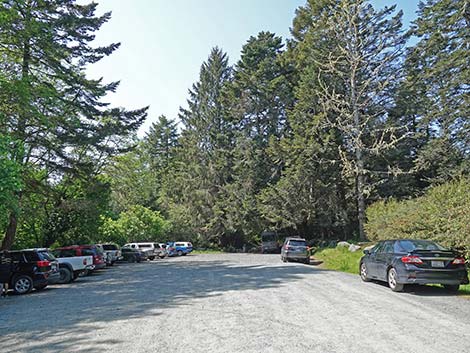 End of the parking area at the trailhead (view NW) |
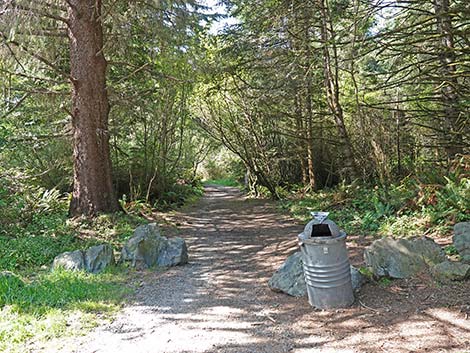 Trailhead (view NW) |
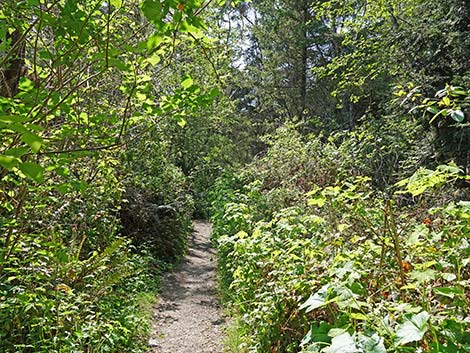 Trail runs into forest with dense undergrowth (view NW) |
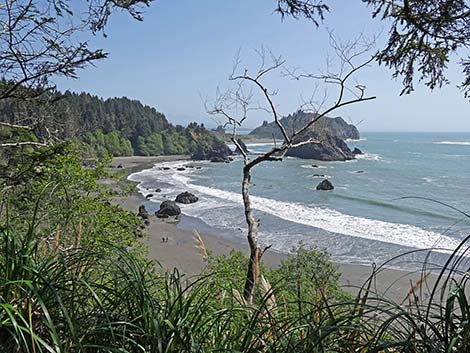 Near the turnoff to College Cove (view S) |
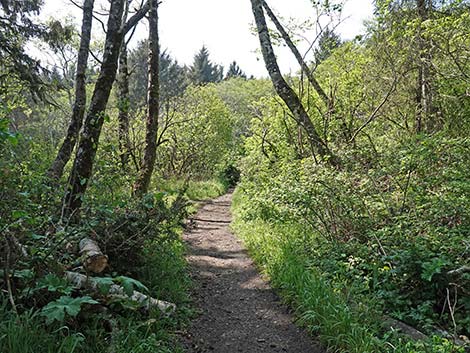 Some parts of the trail are relatively open |
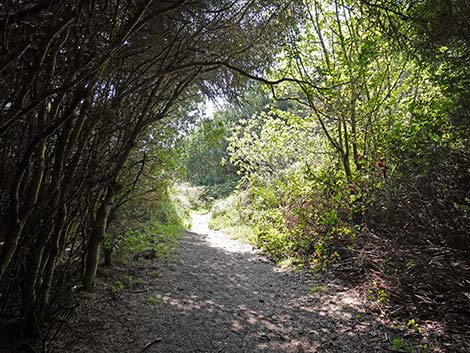 Some parts of the trail are quite dark |
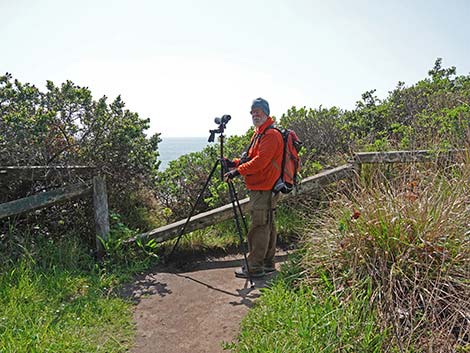 First Viewpoint (Google listed this as "Elk Head") |
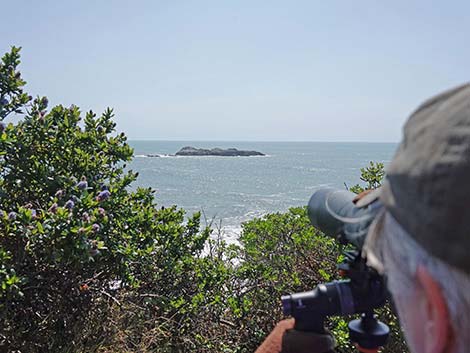 Flatiron Rock (view SW from First Viewpoint) |
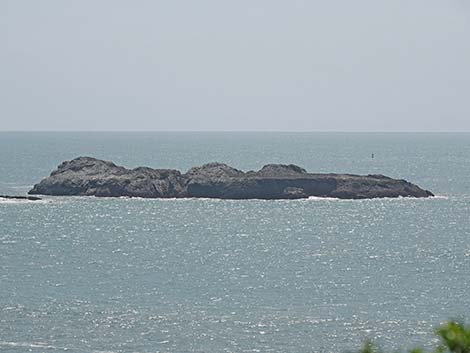 Flatiron Rock (view SW from First Viewpoint) |
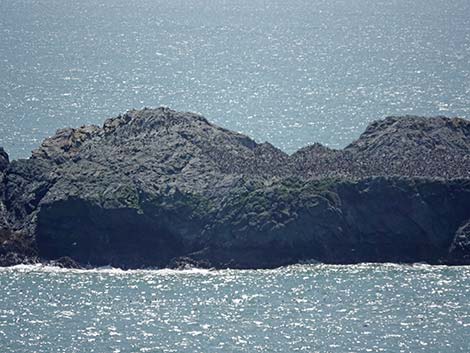 Thousands of Common Murre on Flatiron Rock (view SW) |
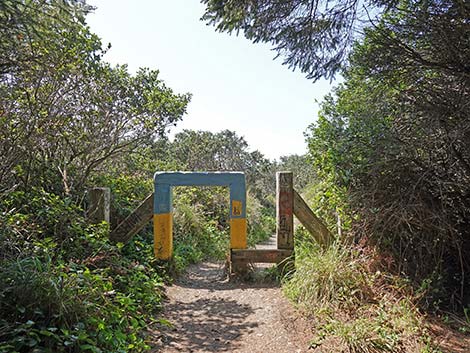 Curious, artistic gate structure (view NW) |
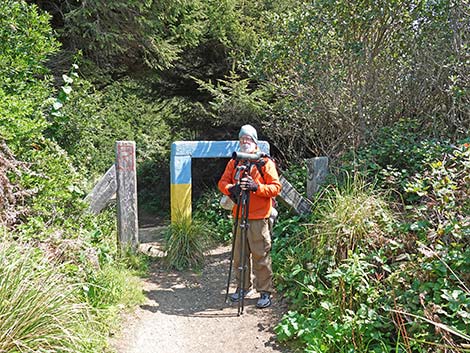 Looking back: curious, artistic gate structure (view SE) |
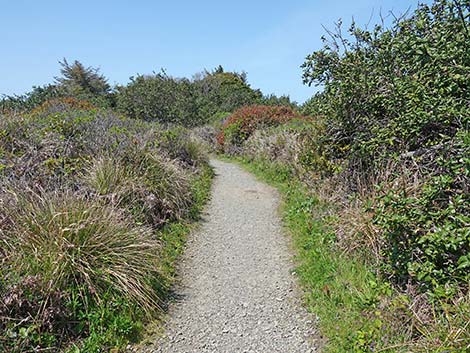 The trail leaves the forest (view NW) |
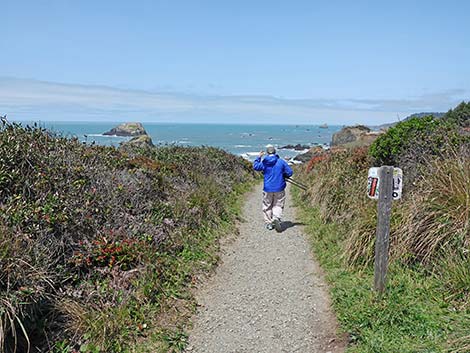 First view of the ocean (view NW) |
 Hiker approaching Elk Head Overlook with view of Green Rock Google lists this as "Megwil Point" |
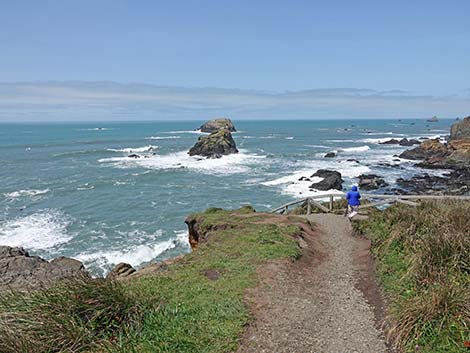 Hiker arriving at Elk Head Overlook Google lists this as "Megwil Point" |
Happy birding! All distances, elevations, and other facts are approximate.
![]() ; Last updated 240322
; Last updated 240322
| Favorite Places Far Away | Birding Around Las Vegas | Glossary | Copyright, Conditions, Disclaimer | Home |